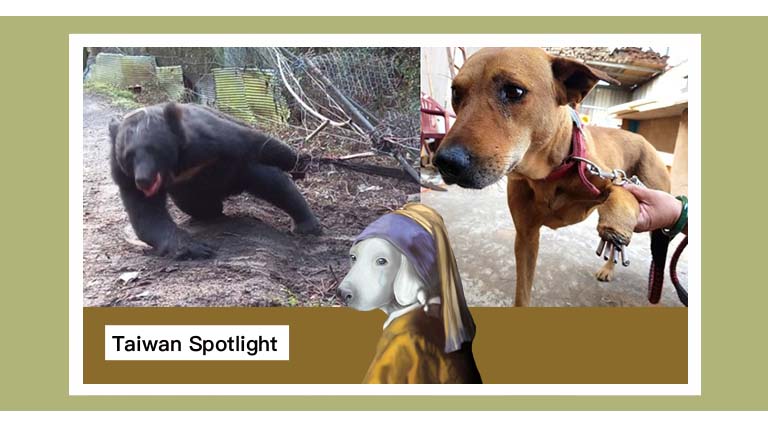

On 1 October 2020, Taiwanese viewers are shocked watching a Formosan black bear painfully struggle on TV news. The bear was trapped by a “hog hang” in an orchard with the left paw snared tight. It was trying to bite off the paw in a desperate attempt to break free. Its bloodstain lips and nose horrified and saddened the public. The recuse took 18.5 hours to finish. The Taiwan Black Bear Conservation Association (TBBCA) confirmed that it was the third time the bear triggered a snare and had to go through finger amputation.
The tragedies of “the black bear, also the Taiwan National Treasure”, and the frequently seen image of the amputated stray dog sparked public concern against animal trapping. Legislator Luo Zhizheng reacted by proposing to amend the “Animal Protection Act” on October 21 to ban improper methods of animal capture. Unfortunately, the conflict between the “Animal Protection Act” and the “Wildlife Conservation Act” once again conflicted, limiting administrative agencies’ ability to enforce the law!

Article 14-1 of the “Animal Protection Act” stipulates that animal foot traps shall not be used for capturing animals without the permission of the competent authority, and shall not be manufactured, sold, displayed, exported, or imported without the permission of the central competent authority. Violators shall be fined more than NTD15,000 and less than NTD75,000. From March 1, 2020, the Council of Agriculture will blacklist both metal lasso traps (boar hanging) and foot traps.
Although Article 19 of the Wildlife Conservation Law also stipulates that traps, animal clips, or special hunting tools cannot be used, exemptions exist. One is the prevention of external threats to agricultural and forestry crops, poultry, livestock, or aquaculture. Another one is the traditional culture and sacrifices that require the Native Taiwanese people to hunt and slaughter animals.

The Wildlife Conservation Law allows farmers to deploy animal traps on their own land and creates a loophole in the law. The competent authority, the Council of Agriculture, has no right to investigate and apprehend illegal animal trapping, hence the rampant usage of foot traps and DIY hog hanging snares.
On November 18, 2020, the media disclosed that the government of Miaoli County connived in the placement of animal traps by farmers. Hundreds of stray cats and dogs lost their limbs as a result. The New Taipei City Animal Protection Department, which has been strictly investigating animal traps such as foot traps and hog hanging snare, found banned traps casually on sales on e-commerce platforms.
Legislator Luo Zhizheng’s proposal to ban animal traps is welcomed, but the enforcement would be difficult even if the law is passed. How to educated people to stop using animal traps that severely injure animals? How to track down and punish the offenders? These questions are to be studied prior to legislation.

